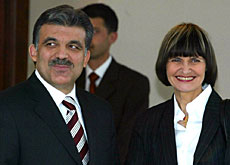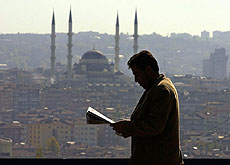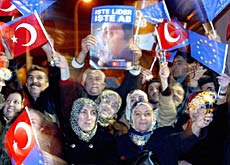Armenia features high in Swiss-Turkish talks

Switzerland and Turkey have agreed to disagree over whether the massacre of Armenians early last century constituted genocide.
During a visit to Ankara, Swiss Foreign Minister Micheline Calmy-Rey and her Turkish counterpart, Abdullah Gül, said more research was needed into the issue.
“I talked to Mrs Calmy-Rey at length about our point of view on the Armenian question and the historical evolution of this problem,” Gül told a news conference after the discussions.
“The positions of Switzerland and Turkey are different,” he added.
Gül commented that the decision by the cantonal parliamant of Vaud to recognise the 1915 slaughter of hundreds of thousands of Armenians as genocide – which put paid to a previously scheduled visit by Calmy-Rey – was “unreasonable”.
Condemnation
In December 2003, a similar vote in the Swiss House of Representatives reached the same conclusion, drawing renewed condemnation from Turkey.
Gül also said on Tuesday he believed that the version of facts put forward by the Armenian diaspora was the cause of misunderstandings on the issue.
Armenians say that about 1.8 million people were killed in 1915, while Turkey disputes this, putting the figure closer to 200,000.
“Switzerland believes it is up to each country to go back over its history and come to terms with it,” Calmy-Rey commented.
She welcomed Gül’s willingness to set up an international commission of historians to throw more light on what was a “difficult subject of history”.
Ankara wanted Switzerland to send experts to take part in the commission’s work, according to Camly-Rey’s diplomatic adviser Roberto Balzaretti.
But he added: “It is too early to talk about that”.
Human rights
The two ministers also discussed human rights, with Calmy-Rey congratulating Gül for the “reforms and efforts that had been made”.
But in a reference to last week’s demonstrations in Istanbul that were violently put down by the authorities, she said she wished that “the political will could be translated on the ground”.
The talks also featured economic ties, which Calmy-Rey said, “could be improved”. In particular, she mentioned the possibility of an agreement between the two countries on the double taxation of goods.
Gül recalled that trade between the two countries had reached $4 billion (SFr4.81 billion) a year, while Swiss investments in Turkey totalled $2 billion.
He also thanked Switzerland for playing host to United Nations talks on Cyprus last year at the Bürgenstock resort in canton Nidwalden.
Courtesy call
Earlier on Tuesday Calmy-Rey paid a courtesy call on the country’s president, Ahmet Necdet Sezer.
She also laid a wreath at the mausoleum of Mustafa Kemal Atatürk, founder of the Turkish republic and its first president.
On the second day of her visit Calmy-Rey is due in the city of Diyarbakir in the mainly Kurdish southeast of the country, where she is expected to meet local representatives and non-governmental organisations.
This section of the trip was viewed in poor light by Ankara in 2003. Shortly after the invitation was withdrawn, the Turkish authorities accused Calmy-Rey of meeting a member of a banned Kurdish organisation in Lausanne.
The Federal Prosecutor’s Office later launched an investigation to find out whether the Swiss foreign minister had been spied on by Turkey’s secret service.
On the final day of her trip, Calmy-Rey is due to give an address to the Swiss and Turkish business leaders in Istanbul.
“Turkey is Switzerland’s most important business partner in the Middle East. Around 40 Swiss firms move there every year,” said Balzaretti.
swissinfo with agencies
Armenians say 1.8 million of their people were killed or deported from 1915-18 by the Ottoman Empire.
Turkey disputes this, putting the figure closer to 200,000.
The treaty marking the birth of modern Turkey was signed in Lausanne on July 24, 1923.

In compliance with the JTI standards
More: SWI swissinfo.ch certified by the Journalism Trust Initiative










You can find an overview of ongoing debates with our journalists here . Please join us!
If you want to start a conversation about a topic raised in this article or want to report factual errors, email us at english@swissinfo.ch.